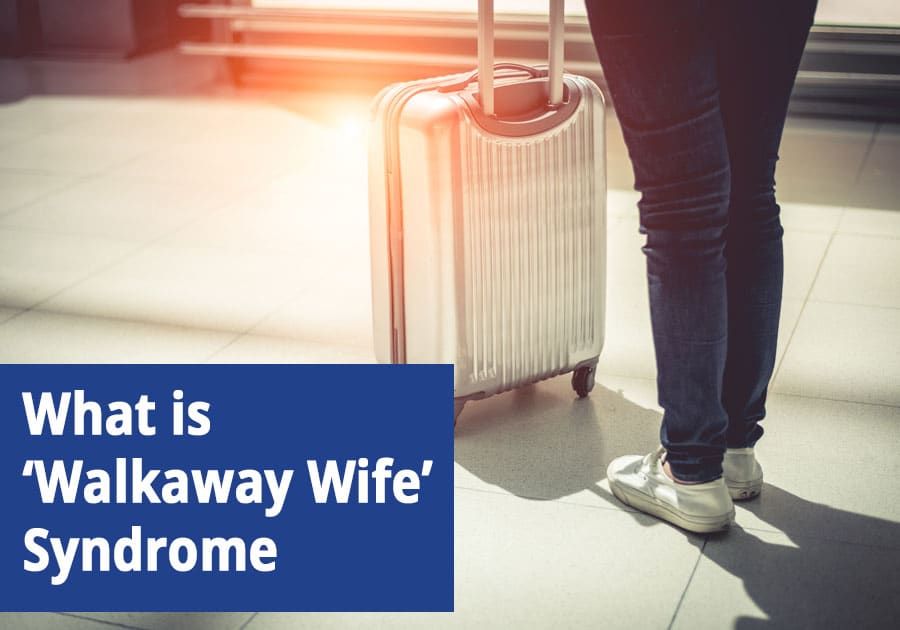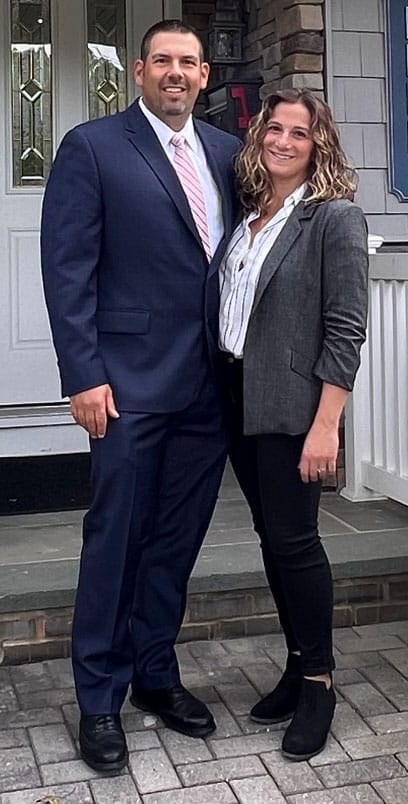Understanding Walkaway Wife Syndrome on Long Island, NY

Suddenly, and seemingly out of nowhere, one spouse decides to leave the other. It may seem like a shock to the other spouse and to the family, but that leaving spouse decides it’s time for the marriage to end, and as a result, they leave abruptly. Although it could be the husband or the wife leaving, this phenomenon is often called “walkway wife” syndrome.
It’s a term used to describe the situation in which one spouse feels neglected, perhaps alone, and often resentful at what is occurring in their life. Their marriage is deteriorating, and instead of trying to improve it, they decide to leave. Understanding what walkway wife syndrome is and how it can impact your divorce on Long Island, NY, is critical.
What Is Walkaway Wife Syndrome?
While it often seems sudden for the family left behind, for many of the people who walk away, walkaway wife syndrome doesn’t happen in just a day. It happens over a period of time, where the person simply cannot deal with the unresolved conflict or other stressor they’ve had to deal with for a long time. In some situations, it can occur quickly, such as when a person learns about infidelity, but often this is just a “last straw”.
Other times, it can develop over years before coming to a head in the filing for a divorce. At some point, for some reason, one party recognizes that there’s no hope of repairing their marriage and just leaves. Even though other people around this spouse may feel like it came out of nowhere, it’s rarely that simple.
While the term “Walkaway Wife Syndrome” is commonly used, it’s important to understand that either spouse, regardless of gender, may reach a point of emotional exhaustion that leads to walking away from the marriage. Similar dynamics can also apply to husbands, often referred to in legal or psychological discussions as “Walkaway Husband Syndrome.” The legal implications, including issues related to constructive abandonment, custody, and spousal support, apply equally to all parties under New York law.
What are the Warning Signs of Walkaway Wife Syndrome?
- The spouse has stopped complaining about the things that they have always. Those behaviors haven’t improved, but the spouse no longer mentions them.
- They seem emotionally distant and disconnected.
- There’s a lack of physical intimacy or meaningful conversation.
- There’s less enjoyment and quality time together. Lighthearted moments and affectionate gestures are rare or gone entirely.
- The spouse may focus entirely on outside-the-marriage responsibilities like work or the children.
- The wife feels overwhelmed, misunderstood, and unsupported. She may notice these signs but feel it’s too late to save the relationship.
- She may express that she no longer feels interested in having sex or spending quality time together.
- The wife starts to emotionally exit the relationship, living life independently and making decisions without considering her partner.
In New York, this form of emotional and physical withdrawal can fall under the category of constructive abandonment, which is one of the fault-based grounds for divorce under Domestic Relations Law §170(2). Although most divorces today are no-fault, citing abandonment may still be strategically relevant, especially when negotiating spousal support or equitable distribution.
If you suspect that there are marital concerns and do not want a divorce, this is a good time to take action. Meet with a marriage counselor or reach out to a couples therapy option that may work for your needs.
How Can Walkaway Wife Syndrome Impact Your Long Island, NY Divorce?
Typically, when this type of situation occurs, the other party has had a long time to think about the impact, including the emotional, physical, and even the overall financial changes that would come with a divorce. They have reconciled with themselves that those complications are better to deal with than remaining in the marriage.
You can fight the divorce, but often, it’s better to prepare yourself for what is to come. That means hiring your own experienced Long Island, NY divorce attorney to ensure that you are going to have fair and full representation throughout this process. If one spouse decides to seek a divorce, they have the legal right to do so. If they actually leave their home and family, then this can impact their ability to enter the home later. Marital abandonment is a serious concern.
Legally speaking, if one spouse vacates the marital residence without consent or just cause, this may be considered marital abandonment, which can have consequences in both custody and property division matters. New York courts often consider the impact of abandonment when awarding exclusive occupancy, dividing assets, or assigning spousal maintenance.
If your spouse left your marriage abruptly and you’re not sure what to do, seek out an experienced divorce attorney who can offer one-on-one guidance and can work to protect your assets and preserve your right to your home and income.
Legal Tip: If your spouse has left the home, you may petition the court for exclusive occupancy to prevent their return and stabilize your living environment.
What To Do if You Suspect Your Spouse Is a Potential Walkaway
If your spouse shows signs of detachment and you fear an impending divorce, there is an opportunity to act. Here are the legal steps you should consider:
- File for Divorce or Legal Separation: Doing this early can secure important financial protections.
- Request Temporary Relief: The court may award temporary spousal support, child custody, or exclusive use of the home.
- Document the Abandonment: Keep a detailed record of emotional withdrawal or other behaviors that support your claim.
- Prepare Financial Disclosures: In New York, you must submit a Statement of Net Worth. Start gathering documentation now.
What if You Need to Leave Your Marriage?
It’s very common for people, even those who may not have a career or full-time income outside of the home, to leave a marriage that makes them unhappy or creates an unsafe living environment. They worry about what could happen if they stay versus if they go. In these situations, we encourage you to take several steps.
- Meet with a divorce attorney. No one has to know you are doing so. Your privacy is fully protected. Your divorce attorney will never break your trust or expose your efforts.
- Consider your family’s mental health. Without a doubt, it’s best to prioritize your safety over anything else. Your attorney can offer guidance on how to do that.
- When the time is right, apply for divorce. Once you meet with your divorce attorney, you’ll gain insight into the legal options you have and can create a plan for the future.
No Matter Where You Stand, We Can Help You
Whether you are considering leaving or have been left, you deserve guidance that prioritizes your rights and your future. At Hornberger Verbitsky, P.C., we help clients navigate the divorce process on Long Island with compassion, clarity, and legal excellence.
We know that neglected wife syndrome, Walkaway Wife Syndrome, and other emotional challenges can complicate already difficult decisions. Our team will work with you to clarify your legal standing, pursue favorable custody or support outcomes, and help you move forward.
Call us at 631-923-1910 or complete our contact form to schedule your free, no-obligation consultation with a trusted Long Island divorce attorney.
GET YOUR FREE CONSULTATION TODAY Call 631-923-1910 or fill in the form below
 Get your complimentary consultation and case evaluation with our experienced attorneys today. Your attorney will describe the many options available and determine together which is the right solution for you. By the end of this conversation, we’ll all understand how we can best help you to move forward.
Get your complimentary consultation and case evaluation with our experienced attorneys today. Your attorney will describe the many options available and determine together which is the right solution for you. By the end of this conversation, we’ll all understand how we can best help you to move forward.
No Cost or Obligation
There is no cost or obligation for this initial consultation. It is simply an opportunity for us to get to know each other, answer your questions and learn if Hornberger Verbitsky, P.C. is right the right law firm for you. Give us a call at 631-923-1910 or fill in the short form below for your free consultation and case evaluation. All Fields Are Required
About the Author
Robert E. Hornberger, Esq., Founding Partner, Hornberger Verbitsky, P.C.
- Over 20 years practicing matrimonial law
- Over 1,000 cases successfully resolved
- Founder and Partner of Hornberger Verbitsky, P.C.
- Experienced and compassionate Long Island Divorce Attorney, Family Law Attorney, and Divorce Mediator
- Licensed to practice law in the State of New York
- New York State Bar Association member
- Nassau County Bar Association member
- Suffolk County Bar Association member
- “Super Lawyer” Metro Rising Star
- Nominated Best of Long Island Divorce Attorney four consecutive years
- Alternative Dispute Resolution Committee Contributor
- Collaborative Law Association of New York – Former Director
- Martindale Hubbell Distinguished Designation
- America’s Most Honored Professionals – Top 5%
- Lead Counsel Rated – Divorce Law
- American Institute of Family Law Attorneys 10 Best
- International Academy of Collaborative Professionals
- Graduate of Hofstra University School of Law
- Double Bachelor’s degrees in Philosophy, Politics & Law and History from SUNY Binghamton University
- Full Robert E. Hornberger, Esq. Bio












